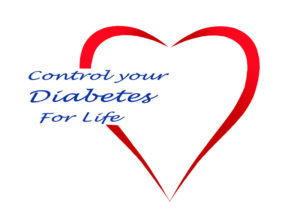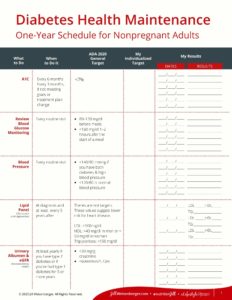Lifestyle Changes versus Drugs: Which is Better for Diabetes Control

Photo by vaeenma/Can Stock Photo, Inc
Just the other day a friend from my childhood contacted me for diabetes advice. What she said is one of the most common things I hear from friends and clients who have been recently diagnosed with type 2 diabetes: “My doc wants me to take medications for my diabetes. I want to try lifestyle first. What changes should I make to control diabetes?”
I truly appreciate the desire to avoid medications. And I understand concerns about side effects. But I also know a lot about what insulin resistance and type 2 diabetes do to the body, how the problem is progressive, how insulin resistance has likely occurred for years before the diabetes diagnosis, how it affects multiple systems in the body and harms the heart and blood vessels and raises the risk for certain types of cancer.
Do NOT Delay Diabetes Management
My quick reply to the “what should I do question” is to use every tool available. Do not wait. Time is of the essence. Make important permanent lifestyle changes now and take your medications now. Control diabetes as quickly as you can.
Yes, there are side effects to taking medications. But there are also side effects to not taking medications. People who successfully manage type 2 diabetes from the time of diagnosis are the ones most likely to have good outcomes years down the line.
I advise my clients to combine lifestyle changes (see below) and diabetes medications. Only once they’ve made solid lifestyle changes, do I suggest that they talk to their healthcare provider about reducing or eliminating medications.
There’s a lot to keep track of with diabetes. Grab your free 1-year schedule of diabetes appointments and tests to keep you in your best health.Combine Lifestyle Changes with Diabetes Medications
Years ago, primary healthcare providers told their patients to work on lifestyle changes for a few months before they prescribed diabetes medications. Today, because of solid research, more providers prescribe lifestyle changes and medication at the same time to control diabetes. Here’s why:
- Type 2 diabetes, characterized by insulin resistance, is a progressive disease. By the time most people are diagnosed with type 2 diabetes, insulin resistance has been going on for many years. Because of its progressive nature, grabbing control as early in the game as possible has benefits many years down the line. That window of opportunity closes ever so slightly every day. Your greatest chance to make the biggest difference is today.
- Managing your diabetes early on means you are less likely to develop heart disease in the coming decades.
- Research suggests that when metformin, the most commonly prescribed medication at diagnosis, is taken soon after diagnosis, it may preserve the ability of the pancreas to produce insulin, thus slowing the further progression of the disease.
- Metformin, which reduces insulin resistance, is usually the first drug of choice because of its safety profile (no drug is without risks, however) and low risk of causing low blood sugar when taken without other diabetes medications. Additionally, taking metformin often helps people lose a few pounds and improve cholesterol levels. Emerging research even suggests that metformin may reduce the risk of developing some cancers.
Not everyone tolerates metformin. Your provider may suggest a different medication.
By the way, there’s A LOT to keep track of with diabetes. To simplify it for you, I put together a schedule for tests and appointments for people with diabetes.
Get Your Free Copy of a Diabetes Health Schedule
So You’ll Know What to Do When
Lifestyle Changes for Diabetes Management
Lifestyle still rocks! To truly benefit, you must swallow your diabetes medication with a large dose of healthful lifestyle. Give yourself an honest appraisal of how you do with each of the following lifestyle domains.
- Exercise: Do you get at least 30 minutes of moderate exercise most days of the week? Every single time you exercise, you improve insulin sensitivity for two to 72 hours! Both aerobic exercise – like walking, jogging and biking – and strength training such as weight lifting or using elastic bands helps with diabetes control and overall health.
- Sedentary behavior: The American Diabetes Association recommends limiting sedentary behavior by breaking up sitting with three or so minutes of walking, stretching or leg lifts every 30 minutes.
- Diet: Many types of eating patterns benefit diabetes management. Resist the temptation to focus only on blood sugar levels. Eat for overall health. A registered dietitian nutritionist who specializes in diabetes care can help you create an individualized eating plan.
- Sleep: Getting too little sleep harms insulin sensitivity and blood sugar control.
- Stress: Excessive stress may or may not have a direct effect on blood sugar management, but it certainly has a way of distracting us from our good intentions to eat well, exercise and get to bed on time.
I’ll write more posts on these lifestyle domains, so stay tuned for more.
Filed Under: Diabetes
Tagged: blood sugar, diabetes diet
Jill Weisenberger
I'm Jill, and I believe simple changes in your mindset and health habits can bring life-changing rewards. And I don't believe in willpower. It's waaaay overrated. As a food-loving registered dietitian nutritionist, certified diabetes care and education specialist and certified health and wellness coach, I've helped thousands of people solve their food and nutrition problems. If you're looking for a better way to master this whole healthy eating/healthy living thing or if you're trying to prevent or manage diabetes or heart problems, you'll find plenty of resources right here.
Leave a Reply
4 Comments
Leave a Comment
Welcome to my Blog
Hi there! I'm Jill, a nutrition & diabetes expert and the author of 4 books.

I believe simple changes in health habits can bring you life-changing rewards.
And I believe willpower is way overrated.
Right here is where you can discover the mindset and habits to stick with healthy lifestyle choices most of the time - and drop the guilt when you don't.
Get the Second Edition!

Featured Posts










Thanks Jill!
Your advice has been invaluable. I was truly one of those who hates taking meds, and just wanted to heal myself with diet and exercise. I had no idea of the silent, symptom free damage insulin resistance can do to my long term health.
The really good news here Maura is that there is so much people with diabetes can do to prevent longterm problems. Be good to yourself!
You say it so well here Jill. I am going to share with my folks. Thanks!
Thanks Marcia!